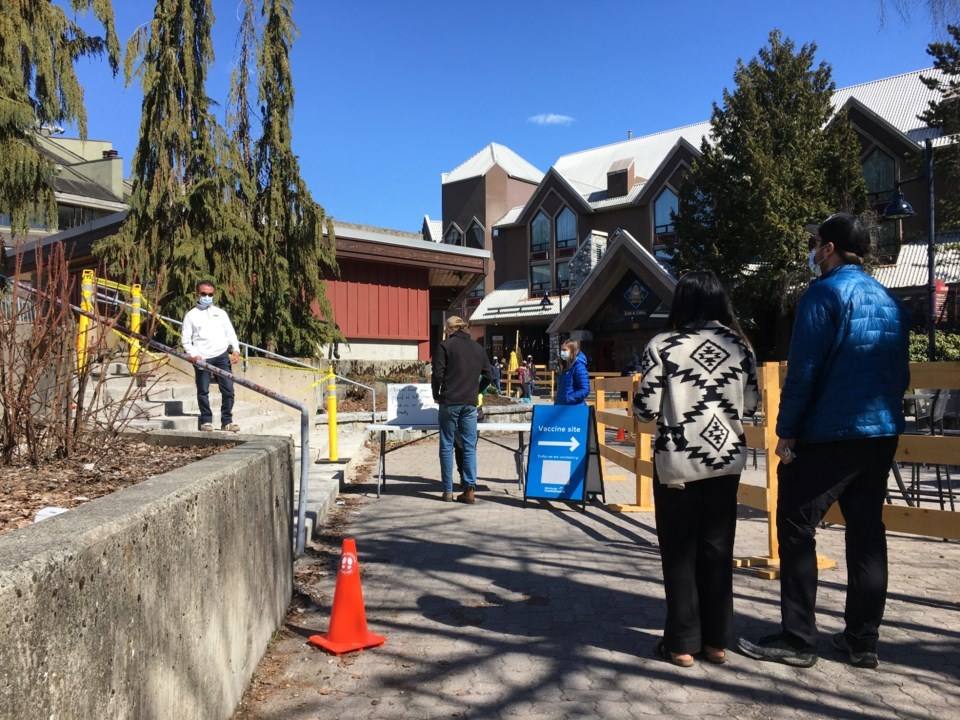A 23-year-old Manitoba man and his parents have filed a civil suit in B.C. Supreme Court alleging he suffered a hemorrhagic stroke and subsequent craniotomy following a COVID-19 vaccine he was administered in 2021 while an employee of Vail Resorts in Whistler.
According to the notice of civil claim filed this month, Jackson Troy Reimer was a Vail Resorts employee working for Whistler Blackcomb and living in staff housing who received either an AstraZeneca or a COVISHIELD vaccine on March 17, 2021, at the Whistler Conference Centre. Six days later, on March 23, the plaintiffs—which include Jackson’s mother, Marina Dawn Toews Reimer, and father, Perry John Reimer—claim that Jackson experienced dizziness, loss of vision, and severe headaches.
After calling his mother to express concern over his symptoms, Jackson was purportedly taken to the Whistler Health Care Centre, before being transferred to Vancouver General Hospital for a CT scan and neurological assessment. The suit said the results of the CT scan showed Jackson had experienced an intracerebral haemorrhage, also known as a hemorrhagic stroke. Jackson also reportedly received two platelet transfusions after it was identified his platelet levels were “critically low,” the suit said.
The next day, March 24, Jackson was reportedly still experiencing severe headaches and could not see. Then, on March 25, the suit claimed Jackson became unresponsive and underwent a craniotomy to stop the bleeding in his brain. After the procedure, Jackson was moved to the intensive care unit for two days, and was intubated.
The suit said that, prior to receiving the vaccine, the then-21-year-old was in excellent health “at all material times.”
The suit names Vail Resorts; AstraZeneca Canada; Verity Pharmaceuticals, the manufacturer of COVISHIELD; the Vancouver Coastal Health Authority; and the Attorney General of Canada as defendants.
The suit alleges that Health Canada, VCHA, AstraZeneca and Verity breached the standard of care by failing to adhere to the Food and Drug Act (FDA). In particular, it argued that Health Canada “knew that many credible foreign authorities” had suspended use of the AstraZeneca and/or COVISHIELD vaccines at the time it was administered to Jackson. The suit claimed that, as of March 16, 2021, 13 European Union countries had suspended its authorization of the AstraZeneca and COVISHIELD vaccines, while authorities in the U.S. had not yet approved its use. At the time of Health Canada’s authorization, “thrombocytopenia” and “coagulation disorders” were an identified risk of the AstraZeneca and COVISHIELD vaccines, the suit stated.
The suit also claims the FDA, which prohibits false, misleading, or deceptive labelling and/or advertising, was violated by “by intermingling the AstraZeneca Vaccine and COVISHIELD in a manner whereby it was unknown to the receiver which vaccine they were receiving. Jackson did not know, and does not know, whether he received the AstraZeneca Vaccine or COVISHEILD.”
It argued Health Canada also breached the FDA by advertising “the first vaccine is the best vaccine” in its public promotion.
Jackson and other Whistler Blackcomb staff reportedly received an email from Vail Resorts on March 15, 2021, stating that VCHA was using the initial shipment of the AstraZeneca vaccine, and it was available to ski-resort employees. The email allegedly recommended employees living in staff housing take the AstraZeneca vaccine at their first opportunity. The email “did not reference COVISHIELD nor did the email provide the warnings associated with the AstraZeneca Vaccine or COVISHIELD,” the civil claim read.
That same email reportedly provided a link to the BC Centre for Disease Control website, which on or about March 15 to 17, 2021, also did not provide information as to the possible side effects of the two vaccines.
A March 30 VCHA memo that was passed on to Whistler Blackcomb staff by Vail Resorts advised there had been a suspension of use of the AstraZeneca and COVISHIELD vaccine in Canadians under the age of 55. The plaintiffs claimed that the suspension of use of the vaccines was “due to an association with cases of serious blood clotting issues in younger individuals following the administration of the AstraZeneca Vaccine or COVISHIELD,” the civil claim read. The memo purportedly further stated that cases of blood clotting in men had been reported, and that “most adverse events occurred between four and twenty days after vaccination,” and that there was “a test for the blood clotting condition and that it was treatable,” the filing went on. The memo reportedly recommended immediate medical attention if prolonged headache or blurred vision occurred.
The plaintiffs argued that, as Jackson’s employer, Vail Resorts owed him a duty of care to “ensure his health and safety, and make him aware of reasonably foreseeable health or safety hazards to which he would likely be exposed through work.” The suit goes on to argue that Vail Resorts had “an economic interest in urging its employees to obtain vaccination status, in order to entice guests and tourists to use its services and facilities benefited from its employees obtaining vaccination status.”
The Reimers are seeking general and special damages, loss of future income and earning capacity, pre- and post-judgement interest, and legal costs.
None of the above claims have been proven in court.





